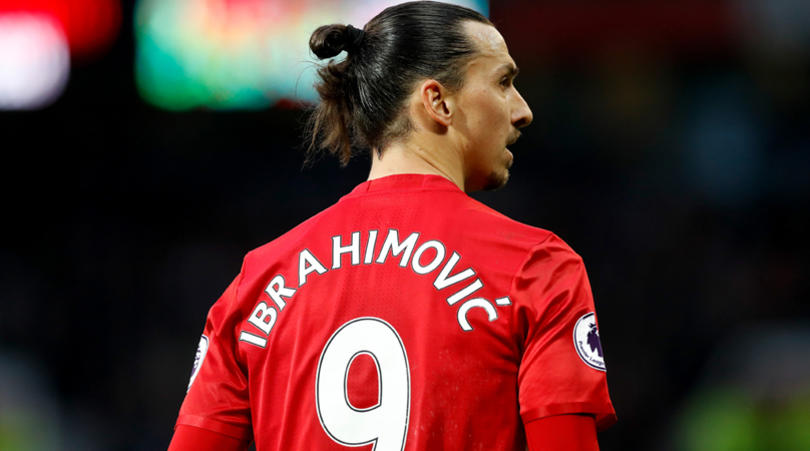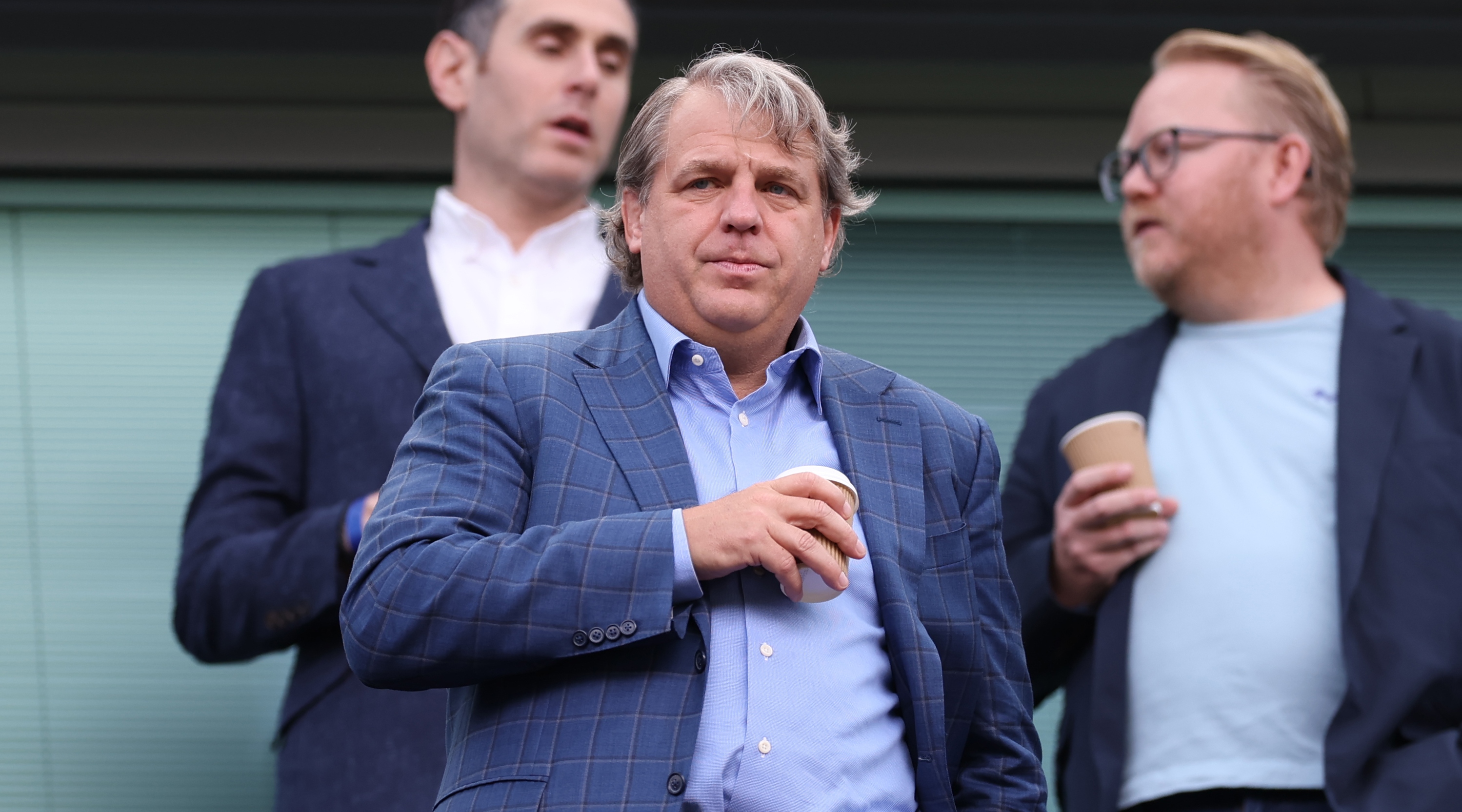Middlesbrough 1996/97: rucks, relegation, cup finals… and training at a prison
Middlesbrough’s Premier League return came on the anniversary of their most memorable campaign, featuring stellar names, two cup finals and, 20 years ago, a very costly cancellation
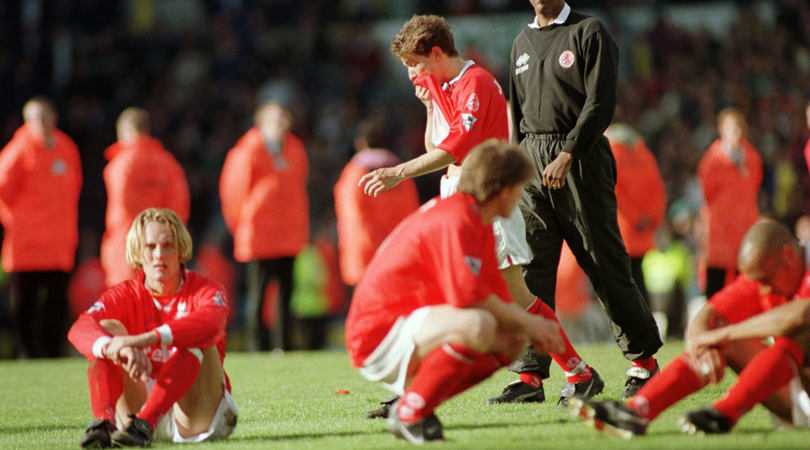
Middlesbrough supporters headed down south to Wembley Stadium in their thousands, with hope in their hearts – and anger, too. It would be the Smoggies’ first (and, to date, only) FA Cup final, yet their joy was laced with pain, their euphoria tempered by relegation from the Premier League. The Boro fans arrived at the symbolic home of English football to protest, finding themselves at war with officialdom and the FA suits they blamed for their club’s demise.
Little did they know, Boro’s players were at war among themselves, unwilling to go down without a fight. At least, that may have been the case off the field. On it, Roberto Di Matteo scored for Chelsea after 43 seconds. The final was over as soon as it had begun.
But what FFT can reveal for the first time is the full story behind Boro’s calamitous season, which ended in fisticuffs between team-mates even before referee Stephen Lodge whistled to get the 1997 final underway.
The angry Italian
It was back at the team hotel where, according to Neil Cox, Fabrizio Ravanelli took exception to an interview that the defender had given to the Daily Star, suggesting the iconic Italian striker should be left out by manager Bryan Robson in favour of Mikkel Beck.
While we were having the photos taken for the suits and sunglasses, he decided to spit and throw a punch. I dived in, fists flying
“I did an interview on the pre-match press day as a favour to a mate and I left Rav out of the starting XI because, like me, he was struggling to be fit and we couldn’t afford to gamble,” Cox says. “On the Saturday, it was all over the back page: ‘Cox – Rav should miss out’. So while we were having the photos taken for the suits and sunglasses, he decided to spit and throw a punch. I dived in, fists flying. I wasn’t slagging him off. I was right. That’s why it got nasty. We had a scuffle.”
Tempers flared as players were about to board the team bus, where comedian Stan Boardman was preparing for the toughest gig of his life.
Get FourFourTwo Newsletter
The best features, fun and footballing quizzes, straight to your inbox every week.
“It turned into the most awful final preparation for the biggest game of most of our lives,” midfielder Robbie Mustoe recalls to FFT. “In the team photograph, you had Ravanelli basically trying to reach across players to have a fight with Neil.
“There was so much crap – even on the way to the game, Rav was shouting at Neil at the back of the bus. There were players sat there who weren’t involved in the game and had been drinking the night before, and Robson thought it would be good to have Stan telling some jokes. It smacked of unprofessionalism.”
Boro were their own worst enemies, says Mustoe’s team-mate, Craig Hignett. “Back-biting, bitching, people wanting to have a fight, and then to go and play the biggest game of our lives – we didn’t give ourselves a chance,” Hignett grumbles. “As a boy I had dreamed about playing in an FA Cup final at Wembley, but behind-the-scenes chaos meant it was just surreal. It definitely contributed to that goal.”
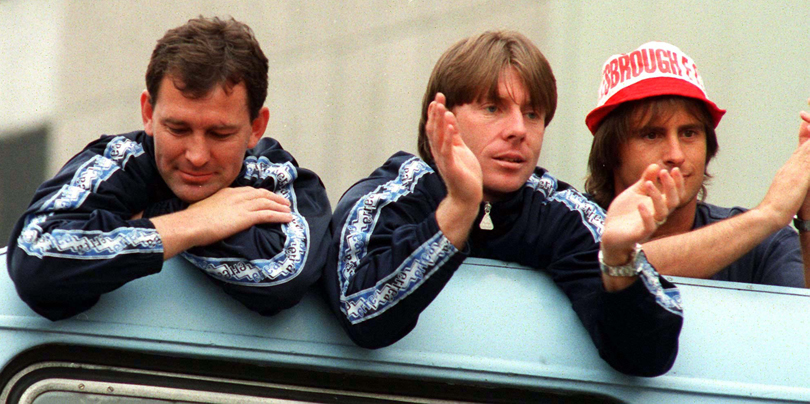
There was anger in the stands as well. Some 30,000 Boro fans vented their collective spleen in the direction of FA chief executive Graham Kelly as he led the royal entourage to meet the players. The Duchess of Kent found herself in the firing line amid a protest at the three-point penalty imposed on Boro for failing to fulfil a fixture in December, which had led to relegation in the league season’s finale the previous weekend.
“It was a difficult day at the end of a difficult season,” says Graham Fordy, club secretary at the time. “You can see why fans wanted to vent their anger at those in authority that they felt were responsible.”
There were players sat there who weren’t involved in the game and had been drinking the night before, and Robson thought it would be good to have Stan telling some jokes. It smacked of unprofessionalism
3 + 8 = nightmare
All this aggro contrasted sharply with the start of Boro’s season and the buzz created by Ravanelli’s arrival, a few months after ‘The White Feather’ had scored in Juventus’s Champions League final win.
Ravanelli, his salt and pepper hair belying his 27 years, had signed for £7 million on a four-year deal initially worth £42,000 per week, and he marked his debut with a Riverside hat-trick in a 3-3 draw with Liverpool – though Boro could’ve done with more than one home dressing room.
“It was like getting Messi or Ronaldo,” Hignett says, “but half of the squad hated him and the other half loved him. He worked hard and he was one of the best finishers I’d seen, but as a man he rubbed people up the wrong way. He was selfish in everything he did.”
Eric Paylor, who covered Boro for the local Evening Gazette, tells FFT he “electrified” Teesside: “Rav was larger than life. There’d never been anyone like him, but he thought he was above the club.”
“Steve Gibson [Middlesbrough’s owner] splashed out on him, Emerson and Juninho to tell the Premier League, ‘We’re on the march’. It was his dream to resurrect the glory days of the Jack Charlton era in the ’70s. It didn’t work, as you had two Boro teams on the pitch at the same time: three world-class stars and the other eight.”
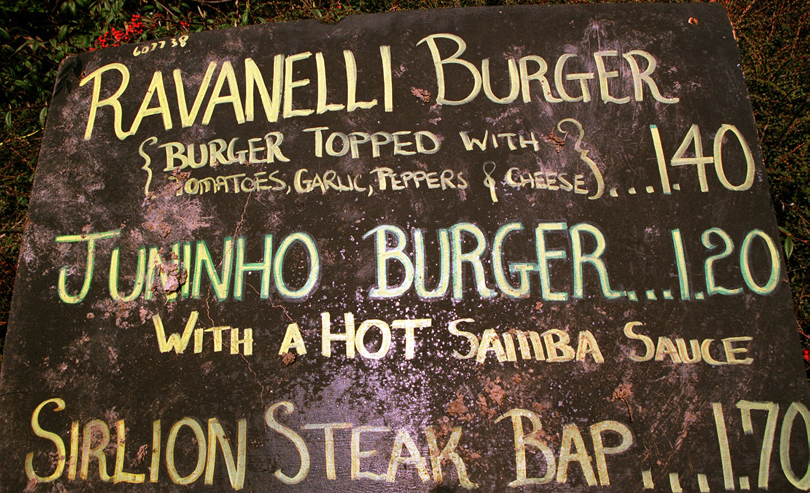
Ravanelli quickly became disenchanted, judging by team-mate Jan Aage Fjortoft’s recollections of a team meeting in November ahead of Boro’s visit to Aston Villa, with the Italian striker being accompanied by agent Gianni Paladini, acting as translator. “Right in the middle of the meeting Rav had a rant, loudly and in Italian, about wanting to leave,” says Fjortoft. “I couldn’t stop laughing. At the end, Bryan said, ‘OK, Rav?’ And Paladini said, ‘Yes, it’s OK’. You could not make it up.”
Middlesbrough lost 1-0 at Villa Park as a campaign that began brightly careered downhill. A 5-1 thumping away at Liverpool stretched a winless league run to 12 games. And things would only get worse.
Infected
While morale sank and injuries took their toll, a virus swept through the camp. This, combined with suspensions, meant Robson was without 23 players on the eve of a pre-Christmas game at Blackburn.
The punishment was an absolute joke. But if I’d have known there was any chance of a points deduction, I’d have fielded YTS lads and the laundry ladies
Paylor was the first person outside the club to learn all was not well. The journalist recalls: “I walked into Robbo’s office at the Riverside and he said, ‘Don’t ask what the team is, as I haven’t got one.’”
Chief executive Keith Lamb summoned Robson, club doctor Laurie Dunn and physio Bob Ward to his office to discuss the severity of the crisis. Lamb also called the Premier League for guidance, and was warned unequivocally that there were clear rules against arbitrary postponements; if Boro called off the game, it would be at their peril. They made the biggest gamble in Premier League history – and lost.
“I was responsible for cancelling the match,” Lamb tells FFT. “I am convinced we did everything properly. We were ‘invited’ to postpone it, but there was a U-turn in the corridors of power that rebounded on us.” Even now, Lamb insists Boro were “harshly treated”.
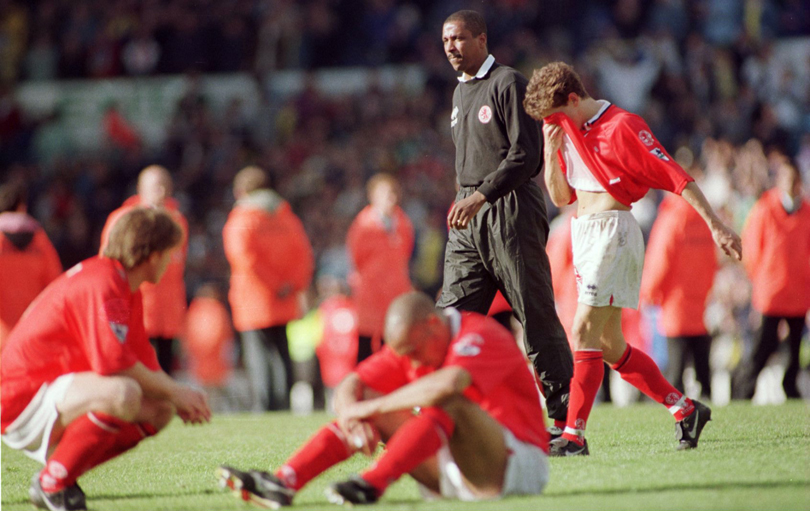
The club miscalculated, thinking they’d escape with just a financial penalty. A month later, despite medical evidence backing their case, Middlesbrough were fined £50,000 and – crucially – deducted three points, after an independent tribunal. The punishment left them four points adrift at the bottom of the table. It was upheld despite Gibson deploying formidable barrister George Carman to argue Boro’s case at an FA appeal. Carman, who once successfully defended comedian Ken Dodd on tax evasion charges, suffered a rare defeat.
“The punishment was an absolute joke,” Bryan Robson explains to FFT. “Three more players had dropped out on the Friday, so we were decimated. But if I’d have known there was any chance of a points deduction, I’d have fielded YTS lads and the laundry ladies.
“We just didn’t have enough players. I was out injured, and had to play away at Arsenal a week later. That made me bail out for good, as I couldn’t move for three days after.”
The New Year’s Day match was Robson’s last, coming 10 days before his 40th birthday. Meanwhile, Gibson was apoplectic, lamenting: “The problem lay with the people at the Premier League. Many questions were never answered and no one came out with any credit. We weren’t treated fairly. It was easy for people to feel bitter and resentful.”
Not everyone thought that it was the authorities who were at fault. “I don’t mind saying it was a bad, regrettable decision from the club and manager,” Mustoe tells FFT. “I’m very bitter. It’s a relegation I will not take – it had nothing to do with my team or me. We could have put a team out. It was wrong. The situation was managed badly.”
“For me, Mikkel Beck – Serie B”
The problem was that Mikkel was listening in
Afterwards, Boro bumped along at the bottom of the Premier League but raised their game for the knockout competitions. They reached the League Cup final, where Ravanelli’s extra-time goal put them on course for a first major honour, before Emile Heskey bundled in a late Leicester equaliser. Boro had do it all again in a replay at Hillsborough.
Ravanelli held Robson responsible for the failure at Wembley, citing his refusal to make any changes in 120 minutes. If he possibly didn’t rate Robson, he certainly didn’t rate his fellow forward Beck.
“He always said he didn’t want to play with him,” Fjortoft explains. “Once, he said in broken English: ‘Jan, I want you play. For me, Mikkel Beck – Serie B’. The problem was that Mikkel was listening in.”
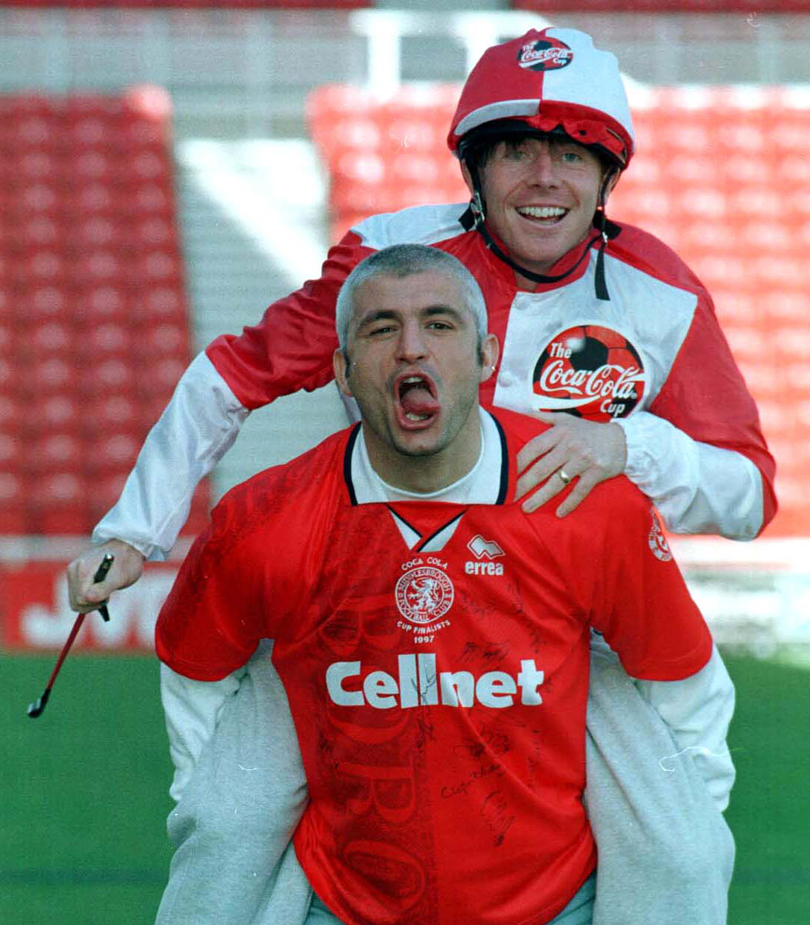
Back in Italy, Ravanelli also showed he had a neat turn of phrase in a damning indictment of Boro’s training ‘facilities’. “They have a Ferrari but they don’t have a garage,” scoffed the striker, fed up of being taxied around Teesside in what Mustoe describes as a “crappy old beat-up bus” to practise at public parks and Kirklevington Grange Prison. “The prison was OK as the playing surfaces were good,” Mustoe adds.
“If there was lots of rain then we practised on ‘The Avenue of Trees’. That wasn’t even a park – just a strip of land between some big trees which sucked up water – so it was a decent place to train.”
Meanwhile, Brazilian midfielder Emerson – described by Paylor as “one of the greatest players I had seen in a Boro shirt” following his early-season displays – was “having his head turned” by reports of a Barcelona move, before getting restless and going AWOL.
“Emerson always seemed to have a ticket back to Brazil,” Fjortoft says. The Norwegian himself left mid-season, as did a young Nicky Barmby and Branco who, Fjortoft adds, “was six kilos overweight when he first arrived and 10 kilos overweight when he left”.
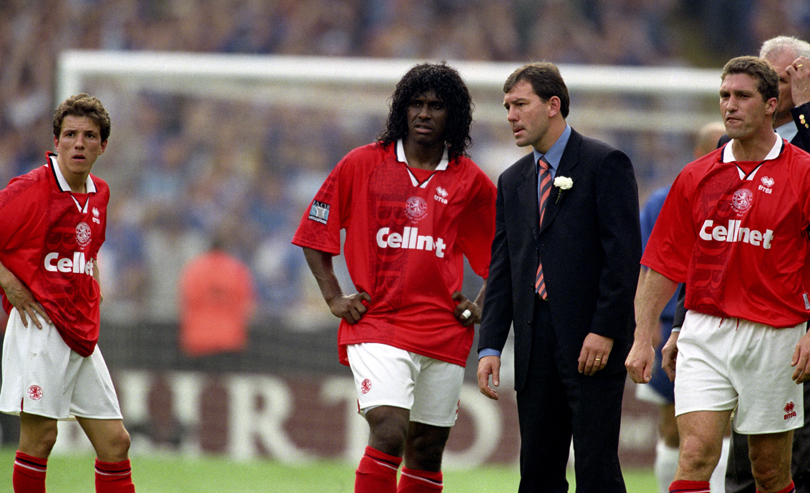
Not their day… again
My abiding memory is looking to my left to see [reserves coach] Gordon McQueen shaking so much, he couldn’t put a cigarette in his mouth
Games came thick and fast due to Boro’s cup exploits, which included a topsy-turvy semi-final at Old Trafford against third-tier Chesterfield, captained by Sean Dyche. The Telegraph called the match “one of the finest FA Cup ties in the competition’s 125-year history”.
“My abiding memory,” says physio Bob Ward, “is looking to my left to see [reserves coach] Gordon McQueen shaking so much, he couldn’t put a cigarette in his mouth. I killed myself laughing, but it was frightening.”
A gruelling contest ended 3-3 after extra-time – not ideal preparation for a League Cup final replay against Leicester just three days later. That, too, went to extra-time, in which Steve Claridge secured victory for the Foxes. “It was a major disappointment losing the finals – especially the one against Leicester, because we were the better team and deserved to win,” Robson sighs. “The boys were devastated. We had a really good team, but I needed four or five more squad players as we just weren’t strong enough to cope with the amount of cup games.”
Chesterfield were eventually vanquished, again in a replay, again at Hillsborough, but Boro faced a fixture pile-up ahead of the FA Cup final. They played four league games in nine days – including the re-arranged trip to Blackburn. The long-awaited match ended 0-0.
The league season culminated in a 1-1 draw at Leeds that condemned Robson’s charges to the drop by just two points. Juninho was crestfallen – the Brazilian would later claim: “It was the worst day of my career.”
Boro’s cause was hindered by Ravanelli injuring his hamstring in a 3-3 draw at Man United two weeks before the FA Cup final. “He disappeared to Italy for treatment,” says Ward. “I was bemused. We should’ve been stricter. We treated him 12-15 hours a day, trying to get him ready for the final, but he wouldn’t let us fitness-test him and he came off early. It was rubbish.”
Ravanelli traipsed off after 24 minutes and Chelsea were unforgiving. Eddie Newton finally put Boro out of their misery.
“Afterwards we all felt like we’d fought 15 rounds in a boxing match,” says defender Curtis Fleming. “Nigel Pearson said before kick-off: ‘Right, lads, we haven’t had loads of luck this season – this could be our day.’
“Then, 43 seconds later, we realised that maybe it wasn’t.”
This feature originally appeared in the January 2017 issue of FourFourTwo. Subscribe!
